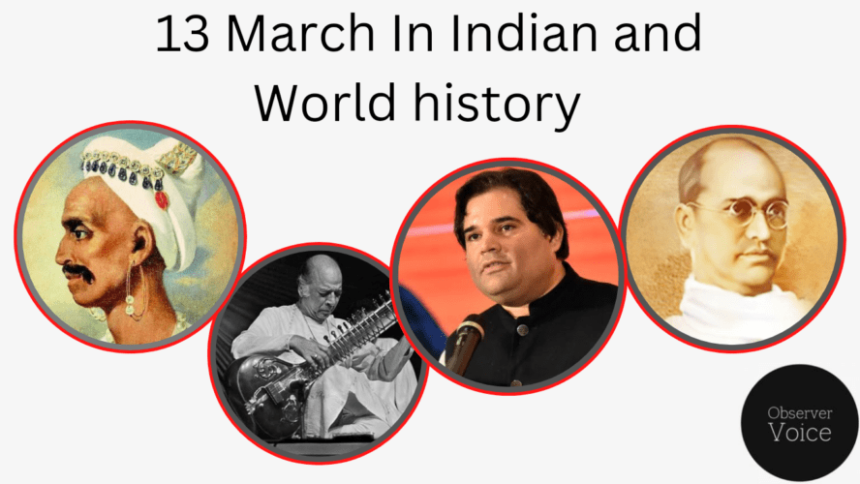13 March in Indian and World History is celebrated, observed, and remembered for various reasons. 13 March is the birth anniversary of Dr Burgula Ramakrishna Rao and Feroze Varun Gandhi.
13 March is also observed as the death anniversary of Nana Phadnavis, Ustad Vilayat Khan, Vallathol Narayana Menon, and Kulakunda Shiva Rao.
Birth Anniversary
13 March in Indian history is celebrated as the birth anniversary of the following personalities:
Dr Burgula Ramakrishna Rao (13 March 1899 – 15 September 1967), the first elected Chief Minister of the erstwhile Hyderabad State. He was one of the founding members of the Hyderabad State Congress. Dr Ramakrishna Rao served as Governor of Kerala, and in July 1959 he dismissed the first elected Communist govt in India, the first-time article 356 was used in India. Later, he also served as Governor of Uttar Pradesh till April 1962. He was born on 13 March 1899 in Hyderabad, India.
Feroze Varun Gandhi, an Indian politician, and a third-term member of Parliament for Lok Sabha from the Pilibhit constituency. He was born on 13 March 1980 in New Delhi, India.
Read More: 12 March in Indian and World History
Death Anniversary
13 March in Indian history is observed as the death anniversary of the following personalities:
Nana Phadnavis (February 12, 1742 – 13 March 1800), an influential minister and statesman of the Maratha Empire during the Peshwa administration in Pune, India. He died on 13 March 1800 in Pune, British India.
Ustad Vilayat Khan (28 August 1928 – 13 March 2004) was an Indian classical sitar player. He composed music for only one film Kadambari (1976). He gave a chance to newcomer Kavita Krishnamurthy in that film, and it was the first song in her career. In 1964 and 1968, respectively, Vilayat was awarded the Padma Shri and Padma Bhushan awards – India’s fourth and third highest civilian honours in 1964 and 1968 respectively, but he refused to accept them. Vilayat Khan died on 13 March 2004 in Mumbai, India, at age of 75.
Vallathol Narayana Menon (16 October 1878 – 13 March 1958) a poet in the Malayalam language. He was a nationalist poet and wrote a series of poems on various aspects of the Indian freedom movement. He also wrote against caste restriction, tyrannies and orthodoxies. He founded the Kerala Kalamandalam and is credited with revitalising the traditional Keralite dance form known as Kathakali. He died on 13 March 1958 at an age of 79.
Kulakunda Shiva Rao (15 June 1924 – 13 March 1992), popularly known as Niranjana, was a Kannada playwright, novelist and freedom fighter. He wrote more than sixty books. He has a soft corner for the downtrodden which are reflected in his various writings. He was awarded with Karnataka Sahitya Academy Award and Nehru Soviet land award for his contribution to literature. Niranjana died on 13 March 1992 in Hyderabad, due to illness.
Read More: 11 March in Indian and World History
Notable events on 13 March in Indian and World history
13 March 1855 – Percival Lowell, an American astronomer, mathematician, and author, was born.
13 March 1902 – Mohammed Abdel Wahab, an Egyptian singer, composer, and actor, was born.
13 March 1940 – Michael O’dyer was assassinated by Indian revolutionary, Udham Singh as revenge for the Jallianwala Bagh massacre which occurred in Amritsar on 13th April 1919.
13 October 1968 – Dame Jean Macnamara, an Australian medical doctor and scientist, best known for her contributions to children’s health and welfare, died.
13 March 1997 – India’s Missionary of Charity selected Sister Nirmala as their new leader after Mother Teresa was unable to lead the organization due to her illness.
13 March 2013 – Perween Rahman, a Pakistani social activist, director of the Orangi Pilot Project Research and Training Institute, died.
13 March is declared as Thai National Elephant Day or Chang Thai Day by the Thai Government. The date was chosen because the Royal Forest Department designated the white elephant as the national animal of Thailand. It is celebrated to show how significant elephants are in Thailand. At the same time, it is to demonstrate how Thai culture depends on elephants. Lastly, this annual celebration promotes awareness about protecting and conserving the Thai elephant population and its habitats.

